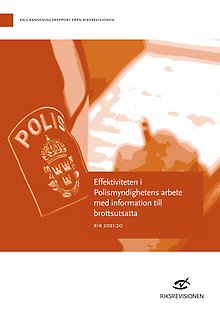Shortcomings in the work of the Police Authority to provide information to victims of crime
The work of the Police Authority to provide information to victims of crime has several shortcomings that may lead to crime victims not receiving the information they have a right to. The Swedish National Audit Office (Swedish NAO) is now calling for a number of improvements

Photo: MATTON COLLECTION
Every year the Policy Authority must provide information to about a million victims of crime of their rights, what support they can receive and how their ongoing cases are progressing. The way this works is deemed to affect confidence in the judicial system and the degree to which people are prepared to participate in the legal process.
The Swedish NAO has audited the effectiveness of the work of the Policy Authority to provide information to victims of crime. The overall conclusion is that there are several deficiencies that in combination can lead to victims of crime not receiving the information they have a right to. The deficiencies largely result from the Police Authority having given their employees important tasks without giving them appropriate conditions or support.
“The Police Authority’s own data indicates that victims of crime do not always receive the right information when reporting a crime. The Police Authority also lacks good solutions on how to provide information about what is happening in cases and why an investigation is discontinued," says Tove Lindström, project leader for the audit.
In the worst case scenario, for example, this may lead to rape victims not being informed at an early stage that they are entitled to an injured party counsel, or that victims of domestic violence are not informed about the possibility of applying for a non-contact order.
The audit also shows that the Police Authority lacks clear procedures for continuously keeping the victim informed during the investigation. The risk that the responsibility for this is overlooked is particularly high in cases that often change case officer or have long processing times.
A fundamental problem is that the Police Authority’s internal governance is not based on analyses of the conditions that the employees face when they provide information, or what support they need in that work. In addition, the Authority does not monitor what or how information is provided.
The Swedish NAO notes that several groups of employees who have these complex tasks receive short training or no training at all. For example, the operators at the Police Contact Centre, which registers 43 per cent of the reports, receive a total of six weeks of training where information to victims of crime is one of many components.
“The audit shows that the work of the Police to provide information to victims of crime has several efficiency problems. But since the Authority has not followed up on how this works, it does not have the data needed to develop the operations," says Auditor General Helena Lindberg.
Recommendations
The Swedish NAO recommends that the Police Authority:
- regularly follow up and evaluate to what extent and how employees provide information to victims of crime.
- evaluate whether employees receive the right support and adapt and develop the support to different employee categories’ different qualifications.
- review the training courses for operators at the Police Contact Centre and for civilian receptionists so that they give employees appropriate conditions to be able to carry out their information tasks when a crime is reported.
- introduce procedures with clear division of responsibilities that ensure that victims of crime receive the information they need throughout the course of the case.
This report is available for download from the Swedish National Audit Office’s website
Press contact: Olle Castelius, phone: +46 8-5171 40 04.
Presskontakt: Olle Castelius , telefon: 08-5171 42 06.
Share in social media and by e-mail
Contact form
Send your questions or comments via the form below and we will make sure that they reach the right member of staff. Please state if your question concerns the information on this particular page.


